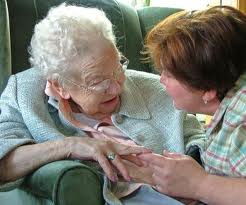 If you are a caregiver to someone with dementia you may have found that communication can be frustrating, but you need to remember how frustrating communication is for the patient as well. As a geriatric care management professional, I’m going to offer a couple of postings on how to get the most out of communication with someone suffering from Alzheimer’s or other types of dementia. The figures reported suggest that as many as one in every ten people over age 65 will develop some form of dementia.
If you are a caregiver to someone with dementia you may have found that communication can be frustrating, but you need to remember how frustrating communication is for the patient as well. As a geriatric care management professional, I’m going to offer a couple of postings on how to get the most out of communication with someone suffering from Alzheimer’s or other types of dementia. The figures reported suggest that as many as one in every ten people over age 65 will develop some form of dementia.
It is important right off the top to appreciate that the dementia patient is going to be frustrated as they try to address not just your questions, but perhaps even who you are. This confusion can manifest itself as anxiety (imagine being always lost), irritability, poor self-esteem or depression (by only if they are aware of their condition). Appreciate also that most forms of dementia are progressive medical conditions that will worsen over time requiring you to adapt your communication to meet the changing needs. Follow these tips for more effective communication for you both:
- When you first approach the patient, do it from the front so as not to startle them; use their formal name – Mr. Jones – as you address them and maintain eye contact.
- Be calm and reassuring by speaking slowly and in a gentle tone, using simple words; repeat yourself if necessary or rephrase only after trying the same wording a couple times.
- Take your time speaking so that the patient can take their time to process your question and formulate a response; and remember just one question at a time.
- How you speak and how you look will be as important as what you are saying, so smile and speak in a gentle voice.
- Humor can be relaxing to both you and the patient, but always be careful to not make the patient feel they are the object of the humor.
- If the patient is a loved one, hugs and touches are every bit as important now as they may have been when the patient was more lucid.
- Try to keep to a regular schedule of daily activities with a dementia patient to help them feel the comfort of a routine; change is difficult and can create unnecessary anxiety.
- Appreciate that early learning may stay for a long time after the patient no longer tracks a given conversation; in religious services I have found that a patient may not track a scriptural reading, but they can recite the Lord’s Prayer.
- While a dementia patient may take longer to dress themselves, it is important to allow them to do so. If you begin doing tasks for them, they may lose the ability to take care of themselves entirely.
Charlotte Bishop is a Geriatric Care Manager and founder of Creative Case Management, certified professionals who are geriatric advocates, resources, counselors and friends to older adults and their families in metropolitan Chicago. Please email your questions to ccbishop@creativecasemanagement.com.




